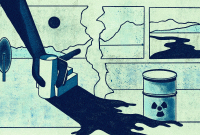Support strong Canadian climate journalism for 2025
On June 30, NB Power registered an environmental impact assessment with the province of New Brunswick and filed a licence application with the Canadian Nuclear Safety Commission (CNSC) to prepare a site on the Bay of Fundy for the ARC-100, an experimental small modular reactor (SMR) still in early design.
Making information public about the project, which includes not just a nuclear reactor new aquatic infrastructure in the Bay of Fundy and new radioactive storage, will be difficult if not impossible without a federal impact assessment. So, too, will testing the veracity of claims made about the project’s safety, risk and impacts. But so far, a federal impact assessment has been denied.
Relying only on the provincial assessment or the CNSC’s review to inform understandings of adverse effects and impacts is a major step backwards. The provincial process has limited opportunities for public input. The CNSC’s licensing process is narrowly defined by the stage of activity being licensed (i.e., site selection, construction, operations and eventual decommissioning).
The federal impact assessment process, conversely, reviews all activities within the lifespan of the project, from development through to decommissioning, including project impacts that are direct or incidental to the project, prior to any decision being made about its development.
The proposed reactor is cooled by liquid sodium metal. No such reactor has ever been successfully commercialized because of many technical problems. Sodium is highly combustible, and experiments with this type of reactor have seen fires and the distribution of radioactive particles on shorelines, even decades after experiments were shut down. The sodium from these reactors bonds to used fuel, and no known commercial method exists to treat sodium-bonded used reactor fuel.
Despite the obvious questions about direct impacts and legacy risks the reactor poses, changes to federal impact assessment law in 2019 mean the project will likely escape a transparent, evidence-based review. After successful lobbying by the nuclear industry and the CNSC in the leadup to passing the Impact Assessment Act, most nuclear projects, from new reactor proposals to the decommissioning of existing ones, were dropped from the list of projects automatically requiring an upfront impact assessment.
There remains one last chance for this highly controversial project to undergo a federal impact assessment. On March 31, three months before the licence application was filed, the Sierra Club Canada joined three community groups with a direct interest in the project — the Coalition for Responsible Energy Development in New Brunswick and We the Nuclear Free North and Protect our Waterways in Ontario — to write to federal Environment Minister Steven Guilbeault, urging him to require the project undergo a federal impact assessment. When a project may cause adverse environmental effects or public concern warrants an impact assessment, the minister has the jurisdiction to order one. Both are true in this instance.
This is the second of such requests for an impact assessment to the minister. Guilbeault rejected the first request in December 2022. However, the new request cites significant changes to the proposed ARC-100 project previously unknown to the public, based on information unearthed through access-to-information requests.
The Ontario groups that joined the Sierra Club in its request have many questions about the radioactive waste from the ARC-100, which is slated to be deposited in a proposed repository in one of their communities. They say no information about the waste from the ARC-100 has been provided to residents living near the two proposed sites for a deep geological repository or along the transportation routes. The groups want information about the volume, nature, characteristics and potential additional hazards associated with the wastes that the ARC-100 could generate.
Indigenous nations have expressed support for an impact assessment because they also have concerns that can only be addressed through a federal review. The group representing the Peskotomuhkati Nation at Skutik, whose traditional territory includes the proposed site in New Brunswick, wrote to Guilbeault in April, raising questions about the ARC-100's profound and lasting impacts to the Bay of Fundy, the marine life the bay supports and coastal communities.
First Nations in Ontario and Quebec are also concerned that nuclear technology operating in one province could have impacts on First Nations in other provinces, triggering the need for an assessment of likely economic, social, cultural and environmental impacts in accordance with the United Nations Declaration on the Rights of Indigenous Peoples.
There are specific concerns that current proposals in place to manufacture fuels at the Canadian Nuclear Laboratories site in Chalk River, Ont., for the SMR in New Brunswick, as well as the prospect of adding radioactive used reactor parts to the controversial Chalk River mound also under consideration by the CNSC, will add to the already detrimental nuclear legacy being borne by Algonquin Nation communities.
And what remains of the status of the impact assessment request to the minister?
Although the request to order an impact assessment was submitted at the end of March, the Impact Assessment Agency of Canada confirmed at the end of June it had not yet acted on the file, despite the demonstration of public interest from groups and First Nations and more than 750 letters supporting the request from Canadians across the country.
Susan O'Donnell is an adjunct research professor and lead investigator of the CEDAR project at St. Thomas University in Fredericton. Kerrie Blaise is an environmental lawyer based in Ontario and founder of Legal Advocates for Nature’s Defence. The authors co-wrote the designation request documentation submitted to Guilbeault in March.








Comments
Sounds like a disaster in the making